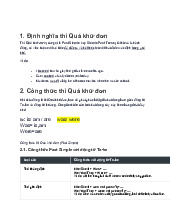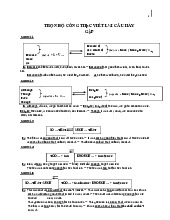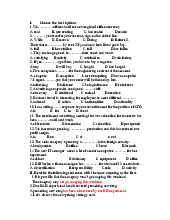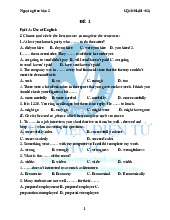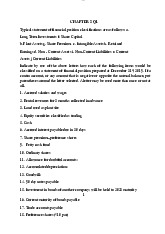



















Preview text:
Downloaded by Ca Nh?t (nhatcanc2000@gmail.com) LISTENING LESSON © lOMoAR cPSD| 49431889
22 MINUTES OF ENGLISH LISTENING PRACTICE
This comprehensive eBook provides the complete audio transcript of my and Will's
conversation, making it the perfect companion to practise your listening and speaking
skills. We have highlighted key vocabulary, providing IPA transcriptions and example
sentences to deepen your understanding, as well as vocabulary comprehension
questions at the end to test your knowledge. PART 1
Lucy: Hello, lovely students, and welcome back to English with Lucy. Today, William and
I, because you may have noticed that my husband is here with me. William: Hello, everyone.
Lucy: We've got a listening slash conversation lesson. I think it's going to be interesting
for you, but also for us. We might end up learning something about each other.
William: Maybe. Hopefully not, because we've been together for nearly six years.
Lucy: So we are going to have a conversation on camera, and for your benefit, on
screen, as we are talking, interesting vocabulary, words and phrases will appear.
I have also created a free ebook for you. It contains the full transcript of this
conversation, all of the key vocabulary, along with the pronunciation, the definitions
and examples, and a quiz so you can put what you've learnt into practice. It's going to
be an awesome resource if you would like to download that free ebook. Where do they have to click? William: Here? Lucy: No.
William: No, where do they? Oh, down there?
Lucy: Yes. Just down there on the link in the description box, you then enter your, what? )YOUTUBE.COM/ENGLISHWITHLUCY LISTENING LESSON © lOMoAR cPSD| 49431889 William: Email address. Lucy: And your name.
William: And your name. Full name.
Lucy: Sorry. Can I ask, do you ever watch my videos? William: Sometimes.
Lucy: You then oin my mailing list, and the ebook will come directly to your inbox, and
then after that, you've oined the PDF club. You will automatically receive all of my free
weekly PDFs and ebooks, along with all of my course updates, offers and general emails.
It's a free service, and you can unsubscribe at any time. Okay. I'm really excited to start this.
William: Me too; I have no idea what the questions are going to be.
Lucy: No, neither do I 'cause one of my lovely teachers prepared them. Okay, I'll go first. What is my favourite food?
William: Fruit, as a general answer. Fruit. But to be specific: watermelons.
Lucy: Yeah. Oh, there's nothing like a good watermelon. And part of the fun of a
watermelon is that they're not grown in England, and you can't access them. So when
you go abroad, and there's a great watermelon... I sound like a total weirdo, don't I?
Watermelon. You can't access them.
William: I don't know. I think the ma ority of people, whenever they go abroad and
come to an exotic fruit... I mean, coconuts for me.
Lucy: Oh yeah. Will loves a coconut.
William: This isn't my question. )YOUTUBE.COM/ENGLISHWITHLUCY LISTENING LESSON © lOMoAR cPSD| 49431889 Lucy: No. So don't take over. William: Sorry.
Lucy: Okay, that was a really easy one. I've made no secret of the fact that I'm absolutely
addicted to fruit—total fruit bat.
William: Well, I also normally buy you a watermelon every birthday. Lucy: That's true.
William: And Easter because you don't like chocolate eggs.
Lucy: I do like chocolate eggs, but I prefer, I'd prefer a watermelon. I mean, you can get
chocolate anytime, but a good, in-season watermelon in the UK? That's a luxury!
William: Yeah! What did Will wear on your first date?
Lucy: I know this like the back of my hand because I remember calling my mum
afterwards and being like, "He's so nice, but he wore a fleece," because I thought that
was so weird. But there's this brand of fleece that only farmers seem to wear called
Schoffel. I'd never seen it before, but it's a very soft fleece with a leather trim. And I ust
thought... I'd never been out with a farmer before, and I thought that's a farmer.
William: You'd also ust come back from Spain. Lucy: Yeah.
William: So if they were selling them in Spain, I would've said that they're in the wrong market. PART 1: VOCABULARY 1)
listening slash conversation lesson n - a lesson in which students practice both
listening and conversation skills in a foreign language, often involving dialogues or role-
plays. We would typically write this out as )YOUTUBE.COM/ENGLISHWITHLUCY LISTENING LESSON © lOMoAR cPSD| 49431889
‘listening/conversation’ utilising the forward slash, but it’s common for people to say
the word ‘slash’ when speaking.
In today's listening slash conversation lesson, we practised discussing our hobbies and
interests with a partner. 2)
there's nothing like phrase - used to emphasise that something is particularly en oyable, special or unique
After a long day at work, there's nothing like a warm bath and a good book. 3)
part of the fun phrase - used to describe a specific aspect or feature of an activity
or experience that contributes to the overall en oyment
Getting lost and finding our way back was part of the fun during our hiking trip. 4)
weirdo n /ˈwɪədəʊ/ - an informal way to refer to a person who is considered
strange or unusual, often in a humorous or mildly derogatory way My brother is such a
weirdo; he loves collecting vintage bottle caps. 5)
exotic adj /ɪɡˈzɒtɪk/ - originating from or characteristic of a distant foreign country,
often seen as intriguing or unusual
The botanical garden has a greenhouse full of exotic plants from all around the world. 6)
like the back of one's hand idiom - used to express that someone knows something extremely well
I know this neighbourhood like the back of my hand, so I'll be your tour guide today.
7) fleece n /fliːs/ - a soft, warm fabric made from sheep wool or synthetic materials,
often used for clothing, blankets or lining; the acket made from this type of fabric
She wore a fleece to keep warm during the autumn hike.
8) brand n /brænd/ - a type of product or service that is easily distinguished by its name,
symbol, or design, often associated with a specific company or manufacturer.
Apple is a well-known brand in the technology industry.
9) leather trim noun - a decorative or functional detail made of leather, often
used to enhance the appearance or durability of an item The leather
trim on her purse added a touch of sophistication. )YOUTUBE.COM/ENGLISHWITHLUCY LISTENING LESSON © lOMoAR cPSD| 49431889 PART 2
Lucy: Yeah, that's true. Okay. My turn. What was the first film we saw together?
William: Oh, I do know this because it was our fourth date: Beauty and the Beast.
Lucy: Yes, it was it. And do you remember how I impressed you on that date? Actually, I did it in two ways.
William: Yes. You brought beer to the cinema. Lucy: In my handbag.
William: In a cinema that didn't serve any alcohol.
Lucy: I ust brought, well, I brought only one for you because I'd also ust passed my
driving test by that point. It was February, and I drove you there in my little car, and it
was traumatic because I wasn't a very confident driver. William: No.
Lucy: But I brought you a beer to have to relax after I traumatised you.
William: Yes. That was very thoughtful. Oh, this is a tough one. How would Will describe
himself in one word? Interesting. Lucy: Laid-back. William: Yeah. Predictable. Lucy: You're very laid-back.
William: No, as in predictable answer. Lucy: Yeah, or chilled. )YOUTUBE.COM/ENGLISHWITHLUCY LISTENING LESSON © lOMoAR cPSD| 49431889
William: Chilled. Yeah. I'm okay with chilled... Lucy: What would you say? William: To describe myself? Lucy: In one word.
William: Spontaneous. No. Laid-back. I would say I've always been laid back. Lucy: Yes.
William: In a good way, though. It's better than being uptight. Lucy: Yes. Opposites attract.
William: You're looking at me, "It's one thing we need to work on."
Lucy: No, I wouldn't say I'm particularly uptight, but I'm definitely not as laidback. I
mean, you are horizontal, to be fair. But I do. I like it. You bring a lot of balance to the relationship.
William: Yeah. Life is all about balance. PART 2: VOCABULARY
1) driving test n /ˈdraɪvɪŋ test/ - an examination of a person's ability to drive a motor
vehicle, typically including a practical assessment and a written or verbal test on traffic rules and regulations
After several lessons, Sarah finally passed her driving test on the first attempt.
2) traumatic adj /trɔːˈmætɪk/ - relating to, causing or resulting from a deeply disturbing or distressing experience
Nathalie’s car accident was a traumatic event that took her months to recover from.
3) to traumatise v /ˈtrɔːmətaɪz/ - to severely emotionally or mentally disturb )YOUTUBE.COM/ENGLISHWITHLUCY LISTENING LESSON © lOMoAR cPSD| 49431889
someone with an extremely upsetting or shocking experience The survivors
were traumatised by the natural disaster and required psychological support.
4) thoughtful adj /ˈθɔːtfl/ - showing consideration for the needs or feelings of others, or
given to careful thought and reflection
She sent a thoughtful message to her friend who was going through a difficult time.
5) a tough one idiom - used to describe a situation, task or problem that is difficult or challenging to deal with
The last question on the maths exam was a tough one.
6) laid-back adj /ˌleɪdˈbæk/ - relaxed, easy-going and not easily stressed or worried
The island's laid-back atmosphere was perfect for a holiday away from the hustle and bustle of city life.
7) predictable adj /prɪˈdɪktəbl/ - behaving or occurring in a way that is expected, with few surprises or changes
The film's plot was quite predictable, but it was still an enjoyable watch.
8) chilled adj /tʃɪld/ - relaxed, calm and not worried
After a stressful week, they spent a chilled evening at home watching films.
9) spontaneous adj /spɒnˈteɪniəs/ - occurring or done without planning, often resulting
from a sudden impulse or desire
Their spontaneous road trip led them to discover many beautiful hidden gems along the coast.
1 ) uptight adj /ʌpˈtaɪt/ - anxious, tense, or unable to relax, often due to stress or worry
He was always uptight about meeting deadlines at work.
11) opposites attract phrase - suggesting that people with very different qualities or
characteristics often find each other appealing or complementary Despite their different
personalities, they were a perfect couple; it's true that opposites attract. )YOUTUBE.COM/ENGLISHWITHLUCY LISTENING LESSON © lOMoAR cPSD| 49431889
12) horizontal adj /hɒrɪˈzɒntəl/ - parallel to the ground or the horizon; lying flat or level
The painting was hung with the longest side horizontal, emphasising the width of the room.
13) to bring balance phrase - to contribute to a state of equilibrium, stability or
harmony, often by counteracting or moderating opposing forces or elements
Practising yoga and meditation can bring a lot of balance to your life, helping you
manage stress more effectively. PART 3
Lucy: Okay. My turn. Who is better at remembering important dates? William: You. Lucy: Why?
William: Because my memory is appalling. No, it is not appalling. My mind thinks very
quickly, so when I think of something, unless I write it down five minutes later, it might
have drifted off, and something else has come in and replaced it.
Lucy: I like the way you didn't say that you are forgetful. You said I think too quickly. I'm
not forgetful; I'm ust too fast. Life cannot keep up.
William: So many ideas. Have you gone from laid-back to 'think too quickly'? I ust can't
keep up with myself, and now I'm crying with laughter. Lucy: Why are you crying?
William: God, the lights are bright, aren't they? I look like you've ust punched me in the face.
Lucy: Oh, don't say that. You'll start rumours. William: No. )YOUTUBE.COM/ENGLISHWITHLUCY LISTENING LESSON © lOMoAR cPSD| 49431889
Lucy: So when we started going out, you were a farmer. I mean, you didn't leave the
farm. There was no option, really.
William: Yeah, my social calendar was empty.
Lucy: And it was only when we moved away that we started having lots more options,
lots more opportunities to see other people go away. And then, we almost went through
a phase where there were too many invitations and too much going on, and there were
multiple invitations on each weekend. And so I put in place a shared calendar, but then
we've had issues with you agreeing to things but not putting it on the shared calendar.
William: I've gone the other end of the spectrum, haven't I? Lucy: Yes.
William: I ust said yes to everything.
Lucy: There were quite a few times where you'd suddenly realised that you'd said yes to
about three different people on the same day. But you know what? It's good problems
to have. Look at us complaining about having too much fun.
William: Too popular. Ooh, this is a good one. Who is tidier?
Lucy: Now, that's the hard one.
William: Yeah. I'm wondering what your answer's going to be.
Lucy: Yeah, so am I. I'd say that we are like swans. Okay. We glide along beautifully like that. Everything looks fine.
William: Yeah, that looks ust like a swan.
Lucy: But underneath the surface of the water, it's like legs are ust everywhere. And I
feel like that's what our personal life is like. Our business life-
William: We're talking about tidying here. )YOUTUBE.COM/ENGLISHWITHLUCY LISTENING LESSON © lOMoAR cPSD| 49431889
Lucy: I'm getting there, okay? William: Right.
Lucy: From the outside, the house looks tidy and amazing, but if you dare to open a
cupboard, a load of crap will fall out.
William: I think a lot of people can relate to that. Lucy: I hope so.
William: I hope a lot of people can relate to that.
Lucy: Yeah. I think probably part of my problem growing up was I had the tidiest mum on
earth, and I almost rebelled against it. I feel like your mum was very tidy as well.
William: She was. She had to look after three boys.
Lucy: So we were spoilt, and we never learnt to tidy for ourselves. I would say we're
both pretty similar on tidiness, as in both quite untidy. What do you think?
William: Well, what do they call it? Agree to disagree.
Lucy: Do you think I'm tidier?
William: I think I'm slightly better. Lucy: Okay. I'll accept that.
William: For the sake of the video.
Lucy: No, for the sake of our marriage.
William: Sorry, I've still got tears in my eyes. )YOUTUBE.COM/ENGLISHWITHLUCY LISTENING LESSON © lOMoAR cPSD| 49431889
Lucy: From when you claimed you think too quickly.
William: And now they're back again. Yeah. Cool. PART 3: VOCABULARY 1)
appalling adj /əˈpɔːlɪŋ/ - awful, dreadful or causing shock or dismay due to a severe lack of quality or decency
The living conditions in the refugee camp were appalling, with people lacking access to basic necessities. 2)
to drift off phr v - to fall asleep or stop concentrating for a moment I was listening
to my friend's story, but I must have drifted off because suddenly, I had no idea what she was talking about. 3)
to keep up phr v - to maintain the same pace, level or progress as someone or
something else or to continue with an activity or effort
He struggled to keep up with his classmates during the race. 4)
social calendar n /ˈsəʊʃəl ˈkælɪndə(r)/ - a schedule or record of planned social
events, activities or engagements
Her social calendar was filled with parties, networking events and dinners with friends. 5)
to go through a phase phrase - to experience a temporary period of particular
interest, behaviour or development, often as part of growing or changing
He went through a phase of being obsessed with comic books when he was a teenager. 6)
shared calendar n /ʃeəd ˈkælɪndə(r)/ - a calendar that is accessible to multiple
people, often used to coordinate events or appointments collaboratively
The family used a shared calendar to keep track of everyone's activities and appointments. 7)
the other end of the spectrum idiom - an opposite or contrasting position or attitude
My friend loves spicy food, but I prefer milder flavours on the other end of the spectrum. )YOUTUBE.COM/ENGLISHWITHLUCY LISTENING LESSON © lOMoAR cPSD| 49431889 8)
swan n /swɒn/ - a large waterbird with a long neck and white or grey plumage
We spotted a pair of swans gracefully swimming in the lake. 9)
to glide v /ɡlaɪd/ - to move with a smooth continuous motion, as if without effort or resistance
The eagle glided through the air, scanning the ground for prey.
1 ) surface n /ˈsɜːfɪs/- the outside part or uppermost layer of something The diver
emerged from the surface of the water with a smile on his face.
11) to dare v /deə(r)/ - to have the courage to do something I didn't dare to jump from the high diving board.
12) a load of crap phrase - an informal way of referring to a large number of items,
often seen as useless or unnecessary
After cleaning out my garage, I realised I had accumulated a load of crap over the years.
13) to relate (to) v /rɪˈleɪt/ - to feel sympathy with or be able to understand someone’s situation or feelings
I can relate to her struggle as I faced a similar situation last year.
14) to rebel against phr v - to oppose or resist authority, control or tradition The
students rebelled against the new dress code policy and staged a protest.
15) to agree to disagree idiom - to accept that people have different opinions and to stop arguing about it
We couldn't come to a mutual agreement, so we decided to agree to disagree.
16) for the sake of phrase - for the purpose of, or to benefit someone or something
I decided to apologise for the sake of our friendship. PART 4
Lucy: Oh, this is a good one. Who is more adventurous?
William: So, in general, I would say you. )YOUTUBE.COM/ENGLISHWITHLUCY LISTENING LESSON © lOMoAR cPSD| 49431889
Lucy: Would you? I would say you.
William: I feel like diving into something new; you are a little bit more up for it compared
to me. But when we actually get there, I feel like I'd probably then take the reins.
Lucy: I think this could describe our whole relationship. I feel like I'm very quick to go for
something and adapt to it, and then you end up doing it better in the long run. And I'm
thinking of every board game we've ever learnt. I always learn the instructions really
quickly, and I win for the first 1 rounds, and then you get it, and then you absolutely take
over. Yeah, I would agree with that. I think that's spot on. Although with sports and
taking risks, maybe you are slightly more adventurous.
William: You never come to the start line. What is Will's pet peeve or biggest pet peeve? Lucy: When people say 11 %?
William: Yes. Yeah, I understand the idea. Sorry, I'm taking over now.
Lucy: No, I love that you're such a YouTuber looking at the camera.
William: No, I love the way the question is, "What's your pet peeve?" And I’m like, right,
I'll take over from here. Yes. I ust think people take it too far. You can't give more. Lucy: It's ust a saying.
William: No, people, they use it in every Apprentice video under the sun.
Lucy: Oh, so this is a TV show in the UK and America where people compete for a ob
position. I remember you coming back from trying to... I think you'd gone with your dad
to buy a new car or something for the farm. It was a new farm vehicle. And I remember
you coming back and said, "Everything we asked him, the guy ust said, '11 %, 11 %,
mate.' Do the wheels work? '11 %.' How good's the engine? '11 %.'" And it ust comes across as insincere.
William: Yeah. It ust doesn't make sense. )YOUTUBE.COM/ENGLISHWITHLUCY LISTENING LESSON © lOMoAR cPSD| 49431889 Lucy: Okay.
William: It doesn't make sense.
Lucy: I'm ust trying to think of any other pet peeves you have. Whenever I touch you with a cold foot.
William: Yeah, I think every guy can relate.
Lucy: Guys, do you hate it when I touch you with a cold foot?
William: Because we need to talk, basically. PART 4: VOCABULARY 1)
adventurous adj /ədˈventʃərəs/ - willing to take risks or try new, exciting experiences
The adventurous couple decided to go skydiving while on vacation. 2)
to dive in/into idiom - to start or engage in an activity or pro ect enthusiastically and without hesitation
She was excited about her new job and started diving into her tasks right away. 3)
to be up for something phrase - willing, eager or prepared to participate in an
activity or accept a challenge
When her friends suggested going hiking on the weekend, she was definitely up for it. 4)
to take the reins idiom - to take control or responsibility for something, especially in a leadership role
When the manager went on maternity leave, her deputy stepped in to take the reins. 5)
to adapt (to) v /əˈdæpt/ - to ad ust or modify one's behaviour, attitudes or
approach in response to new or changing circumstances, conditions or requirements
It took him some time to adapt to the new culture when he moved abroad. )YOUTUBE.COM/ENGLISHWITHLUCY LISTENING LESSON © lOMoAR cPSD| 49431889 6)
in the long run idiom - over an extended period or in the final outcome,
considering future consequences or implications
Cutting corners on safety measures might save money now, but it could be costly in the long run. 7)
board game n /bɔːd ɡeɪm/ - a tabletop game that involves the movement of pieces
on a pre-marked surface based on a set of rules or ob ectives They spent the evening
playing board games like Monopoly and Scrabble. 8)
to take over phr v - to assume control or responsibility for something, often in
place of someone else, or to become dominant or widespread When the company's
founder retired, his daughter was ready to take over the business. 9)
spot on phrase - precisely accurate, correct or appropriate; exactly right The
weather forecast was spot on, predicting the exact time the storm would arrive.
1 ) pet peeve n /pet piːv/ - a minor annoyance or irritation that someone finds
particularly bothersome, often more than might be expected One of his pet peeves
is when people chew loudly in public.
11) to take it too far idiom - to exceed reasonable or acceptable limits in behaviour,
actions or statements, often causing offence or distress
The prank was initially funny, but they took it too far when they involved the police.
12) under the sun idiom - used to refer to everything that exists, can be imagined or is
possible within a particular context
The store had every type of candy under the sun, making it difficult to choose just one.
13) insincere adj /ˌɪnsɪnˈsɪə(r)/ - not expressing genuine feelings, thoughts or
intentions; dishonest, untruthful or hypocritical
His apology felt insincere, as he did not seem truly remorseful for his actions. PART 5
Lucy: Okay. Who is more honest? )YOUTUBE.COM/ENGLISHWITHLUCY LISTENING LESSON © lOMoAR cPSD| 49431889
William: I would say it's a 5 /5 split. You want me to elaborate?
Lucy: Yes, it's a conversation lesson, Will.
William: You're looking at me like I was dishonest about something this morning.
Lucy: No, it's ust that the students are waiting. They know 5 /5 split by now.
William: I can't think of a time where I've lied to you. Ah, but this was years ago. Lucy: What was that?
William: And this was when I pretended to be on the farm, and I was actually going to
London to collect the engagement ring.
Lucy: Yes. What a terrible lie. William: Yeah.
Lucy: I don't think I've ever really lied unless it's like-
William: Keyword there, "really."
Lucy: Really. No, I think it's ust like you have the odd white lie, don't you? William: Yeah.
Lucy: You know, but nothing serious. But I think more as honesty as a personality. I'm not
one of those people that will not be able to sleep unless I tell the absolute truth on how
I'm feeling in every single conversation. If someone asks me, "Do you like my dress?"
And I don't like it, I'm not going to cause a scene and tell them that I don't. But I know
some people stand by that and think, no, if I don't like something, I'm going to say it.
William: I'm quite good at letting things go. I'm quite tolerant. )YOUTUBE.COM/ENGLISHWITHLUCY LISTENING LESSON © lOMoAR cPSD| 49431889
Lucy: Yeah, that's another word I would use to describe you. William: Tolerant.
Lucy: Tolerant. That makes me sound like a nightmare.
William: Yeah, I was going to say the word you'd go for is tolerant.
Lucy: Tolerant. Yeah. And me? Tolerable.
William: Yes. Persistent. This is a good question. Who is Will's celebrity crush? Lucy: Oh, Jennifer Aniston.
William: Yeah. Jennifer Aniston.
Lucy: You look like I had to tell you that.
William: I thought you were going to say a different answer.
Lucy: What was I going to...? I would like to think Scarlett Johansson, although she never really has... William: Messaged me? No. Lucy: Messaged...
William: Never really what? Come up in conversation?
Lucy: I think she's mine. If I had a female one. Yeah. Jennifer Aniston.
William: Yeah, Jennifer Aniston. )YOUTUBE.COM/ENGLISHWITHLUCY LISTENING LESSON © lOMoAR cPSD| 49431889 PART 5: VOCABULARY 1)
5 /5 split phrase - an equal division of something between two parties, with each receiving half of the total
They agreed on a 50/50 split of the profits from their joint business venture. 2)
odd adj /ɒd/ - occasional, infrequent or irregular; not conforming to what is usual or expected
She enjoys the odd glass of wine with dinner but doesn't drink often. 3)
white lie idiom - a small, harmless lie, often told to avoid hurting someone's
feelings or causing unnecessary worry or conflict
She told a white lie about enjoying the meal so as not to offend her friend who had cooked it. 4)
to cause a scene idiom - to create a public disturbance or display of strong
emotions, often drawing attention and causing embarrassment or discomfort for others
When he was unhappy with the service at the restaurant, he started to cause a scene,
upsetting the other diners. 5)
to stand by phr v - to remain loyal, supportive, or committed to someone or
something, especially during difficult times or challenges
She promised to stand by her friend during the trial, offering emotional support and encouragement. 6)
to let things go idiom - the act of releasing or moving past negative emotions,
situations or conflicts, often in the interest of personal well-being or maintaining harmony
Kenny has been working on letting things go and not dwelling on past mistakes. 7)
tolerant adj /ˈtɒlərənt/ - showing a willingness to accept opinions, beliefs, or
behaviours that differ from one's own; demonstrating patience or endurance in difficult situations
The teacher was tolerant of the students' differing opinions, encouraging open discussion and debate. )YOUTUBE.COM/ENGLISHWITHLUCY LISTENING LESSON © lOMoAR cPSD| 49431889 8)
tolerable adj /ˈtɒlərəbl/ - able to be endured or accepted, often despite being unpleasant or less than ideal
The pain from the injury was tolerable, so she decided to continue playing the game. 9)
crush n /krʌʃ/ - a strong but usually temporary romantic attraction or infatuation
towards someone, often without any significant basis or relationship.
Do you still have a crush on the guy in the HR department? PART 6
Lucy: Okay. This is a good one. What's the first gift I ever gave you?
William: I think it was a red British and Irish Lions rugby acket.
Lucy: I went to the ends of the earth for that. And by the ends of the earth, I mean Luton.
William: The acket itself... So the British and Irish Lions, for those of you who don't
know, it is a combination of England, Scotland, Ireland and Wales. And they play every four years- Lucy: Rugby.
William: Rugby against the Southern Hemisphere, whether it's South Africa, Australia
and New Zealand. And it's something that's on my bucket list of going on one of their
tours. It lasts two weeks to a month. And I've always followed them ever since I was a
young child, I always wanted their kit.
And there was one acket in particular that I saw that year, which I really, really wanted,
and I almost bought it for myself. But when I went to purchase it online on a website,
and it said there's one left in stock, I said, you know what, I'm going to buy it tomorrow.
And I went back the next day, and it had gone, and I was distraught. And this must have
been two weeks before Christmas Day, and Christmas Day came, and I opened up my
present from Lucy, and there was this bright red British and Irish Lions rugby acket. And
you then told me the story of how you got it. )YOUTUBE.COM/ENGLISHWITHLUCY
